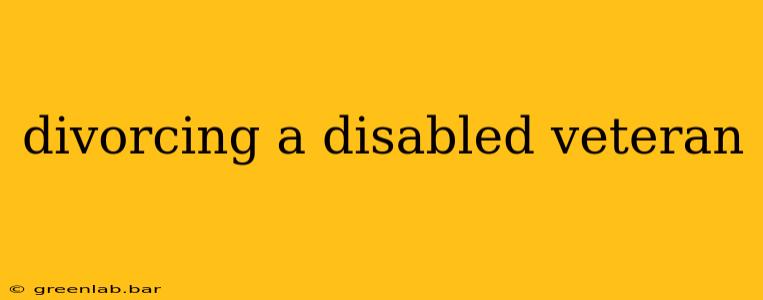Divorcing a disabled veteran presents unique challenges not found in typical divorces. The presence of disability benefits, VA home loans, and potential service-connected disabilities significantly complicates the division of assets and spousal support. This comprehensive guide explores the key legal and financial considerations involved in divorcing a disabled veteran, offering crucial insights for both veterans and their spouses.
Understanding the Impact of Disability Benefits on Divorce
A significant portion of the complexities surrounding divorcing a disabled veteran stems from the treatment of disability benefits in divorce proceedings. These benefits, provided by the Department of Veterans Affairs (VA), are generally considered non-marital property and are therefore typically not subject to division during divorce. This means that the disabled veteran spouse generally retains these benefits.
However, this is a crucial point that requires nuance: while the benefits themselves are generally not divisible, assets purchased with those benefits might be. For example, a home purchased using VA loan benefits, or investments made with disability compensation, could be subject to equitable distribution depending on state laws. This requires careful legal counsel to navigate.
Key Considerations Regarding Disability Benefits:
- Service-connected disability: The source of the disability plays a crucial role. Benefits stemming from a service-connected disability are usually protected.
- State laws: State laws vary considerably in how they handle marital property and the treatment of disability benefits. It's critical to understand the specific laws in your state.
- Separate property vs. marital property: Clearly identifying assets acquired before the marriage, after separation, or solely through disability benefits is essential to prevent disputes.
Dividing Assets and Debts in a Veteran's Divorce
The division of assets and debts in a divorce involving a veteran can be complex. The presence of a VA home loan, for instance, introduces several factors to consider. The mortgage may be the veteran's responsibility, but the equity built in the home during the marriage may be subject to division. Similarly, other assets acquired during the marriage, even if partially funded by disability benefits, may be deemed marital property.
Key Assets and Debts to Consider:
- VA Home Loan: The equity in a home purchased through a VA loan is a significant asset. Determining its fair market value and how to equitably divide it is crucial. Often, a buyout or refinance is necessary.
- Retirement accounts: Military retirement and other retirement savings accumulated during the marriage are generally subject to division.
- Disability compensation: While not directly divisible, any assets purchased using this compensation may be considered marital property.
- Life insurance: Policies acquired during the marriage are usually subject to division.
- Debts: Jointly held debts are subject to division according to state laws.
Spousal Support (Alimony) in Veteran Divorces
Spousal support, or alimony, is determined on a case-by-case basis, taking into account several factors, including the disabled veteran's income (including disability benefits), the spouse's ability to become self-supporting, and the length of the marriage. A court may consider the veteran's disability in determining the amount and duration of alimony. However, it is crucial to note that disability benefits are usually not considered income for alimony purposes in many jurisdictions.
Seeking Legal Counsel
Navigating the legal complexities of divorcing a disabled veteran requires the expertise of a family law attorney experienced in military divorce and veterans' benefits. They can provide guidance on the specific laws in your state and help you protect your rights and interests. Failing to seek legal representation could have significant financial and emotional ramifications. Consult an attorney early in the process to understand your options and develop a strategic approach.
Disclaimer: This information is for educational purposes only and does not constitute legal advice. It is essential to consult with a qualified legal professional for advice tailored to your specific situation.

